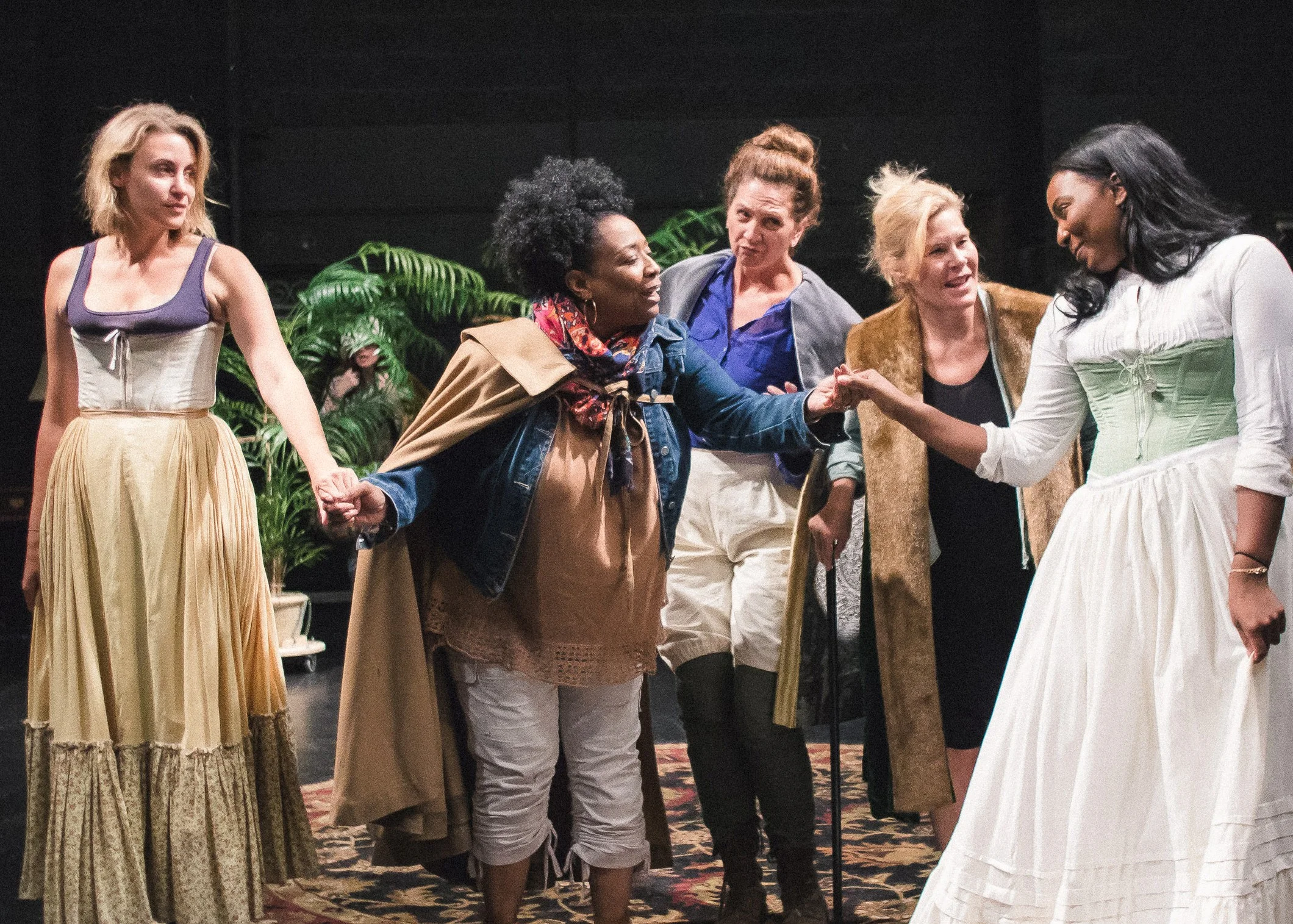E. FAYE BUTLER - A National Treasure
There's a little motto that the amazing E. Faye Butler saved until the end of our delightful conversation between rehearsals on September 8th at Chicago Shakespeare Theater.
The reference, of course, is to her role in the smash hit production of Chicago at Drury Lane earlier this year which just received five 2017 Joseph Jefferson Award nominations including Best Production-Large and Supporting Actress for Butler in the role of Mama Morton, another in a long and distinguished list of roles and musical performances that make Chicago’s E. Faye Butler a National Treasure.
E. Faye Butler is currently preparing for the Chicago Shakespeare Theater's all-woman production of Taming of the Shrew, conceived and directed by CST's Artistic Director Barbara Gaines. The play, set during the 1919 suffrage movement in Chicago, features a new framework written by Second City’s Ron West and a superb, all-star, all-woman cast.
There is much more in our fascinating conversation about the production, her career, and how her famous name came to be.
E. Faye Butler in rehearsal for Chicago Shakespeare Theater’s production of The Taming of the Shrew directed by Barbara Gaines, in CST’s Courtyard Theater, September 16–November 12, 2017. Photo by joe mazza.
What’s in a name … “it’s my mom’s name, my grandmother’s name and my great-grandmother’s name … so I am the 4th generation of Elizabeth Faye … my grandmother was ‘Lizabeth’. My great-grandmother was ‘Lizzy’, my mother was ‘Liz’. I was ‘Faye’ … my mother hated that I did that ‘E’ thing. “Your name is ‘Elizabeth Faye’. Why can’t you use it?” I said, “Someone has it in the union, Ma!” She didn’t care though. She was like 'I want your full name!' … then about ten years ago, Elizabeth Butler died. And so did Faye Butler. And the union called me and said, “Would you like your name?” and I said “No. Not at this late stage in my life. I’ll just keep E. Faye Butler.”
On the Jeff nominations for 'Chicago' … “Drury Lane was the first theater outside of the national tour that was doing Chicago … Bill Osetek worked ten years to get the show and finally getting it, landing it and doing such a beautiful job with costumes, lighting, set, the music and then to be acknowledged for it, that’s a great thing. I know Bill is happy. I’m so excited for everybody at Oakbrook.”
Be nice to 'Mama' … “A lot of people think that Mama Morton is a matron, the warden of the prison. She’s not. She’s an inmate. Bill wanted to be very clear that she was an inmate. She was a woman who was matron of her cell block and possibly killed, probably, 10-15 people and would be in the prison for the rest of her life. And because she was a matron, she could go and come from the prison, so she hustled a lot. She could get you liquor, she could get you the girls, she could get anything you wanted in prison … and the girls loved her and revered her. She had a hard edge to her, but she was still a good sweet lady at the end of the day.”
The Chicago Shakespeare Theater’s all-woman production of The Taming of the Shrew … “This is one of (Shakespeare’s) early works and it has holes in it. I love Barbara Gaines because she knows how to sew those holes up. She has amazing strokes. She knows how to color anything in and she’s done an amazing job with the text herself and along with Kevin Goodall and Ron (West) with his framework. It tells the story of the Columbia Women’s Club from Chicago in 1919 on the day that the vote is passing for women to have the right to vote … there’s a lot going on that day, but the biggest thing going on for the women’s club that day is making sure they complete the cannon of Shakespeare’s work by doing Taming of the Shrew. … There are thirteen amazing performers that happen to be women standing on stage, amazing human beings that I have had the joy to work with.”
What the audience discovers … “You will see yourself on that stage - man or woman - everyone will walk out of that theater with an opinion. It will bring conversation. You will have a word to say when you leave that theater. This is the beauty of what we have been doing with Taming of the Shrew. ... the framing work of the Suffragettes of 1919. … definitely an experience. A great night in the theater … something we don’t talk about a lot. About women. Our rights and what’s happening around us. And this is a great way to discuss it by coming to see this piece.”
(l-r) Alexandra Henrikson as Katherine, E. Faye Butler as Baptista, Tina Gluschenko as Hortensio, Hollis Resnik as Gremio, and Olivia Washington as Bianca. Photo by joe mazza.
On presenting Shakespeare with women in all of the roles … “We look at it in a different way. We can pull it apart and help the piece in a great deal because we see it from a different perspective. Not changing the story. Understand that just like in Shakespeare’s time, where men performed women’s roles in Shakespeare’s pieces, we are women performing men’s roles in a Shakespeare piece. So, we are not trying to change anything about it, we are as masculine as can be, just as men were as feminine as they could be in the period. We’re not trying to pretend we are anything but what we are. … Because we are women doing it, you see it through a different lens. You don’t even have the choice not to see it that way.”
On playing the widower Baptista … “He has two daughters. The oldest one is Katherina, Katherine or 'Kate'. Kate is a handful. We don’t know exactly how, when or why, but (her mom’s death) has changed her. Everyone wants the younger daughter (Bianca), not just because she’s the prettiest, but she’s the easiest to tame. She’s quiet. She’s submissive. She does as she’s told. She’s beautiful. She’s all the things we want our little girls to be. Katherine, on the other hand, has a major opinion about everything in life. You say ‘white’, she says ‘black’, you say ‘sit’, she says ‘stand’ … no matter what it is, she’s belligerent, hard-headed. She is a beautiful girl, but her beauty is stunted because of her mouth. She will challenge any man, at any time, about anything. Everyone wants to marry Bianca and the father will not allow his youngest daughter to be married before his elder daughter is married. So, here comes a man, Petruchio, who is looking for a wife but everyone says the problem is no one can tame her. You will never be able to control this girl … and he comes to the father and says 'If you allow me to have her dowry, I will tame her.' And he says ’Really! I don’t think you can.’ And therein lies the story of the beginning of Taming of the Shrew.”
Tina Gluschenko, Alexandra Henrickson and E. Faye Butler in rehearsal for Chicago Shakespeare Theater's production of The Taming of the Shrew, directed by Barbara Gaines, in CST’s Courtyard Theater, September 16–November 12, 2017. Photo by joe mazza.
On acting and singing … “I am an actor that sings. … I started out as a classically trained actor at Illinois State … with Bruce Young and Susanne Douglas as classmates … in the mid 70’s, you come to Chicago and you think you’re going to break every door down. And it just wasn’t that was for a young African American girl coming out of a major program that prepared me for business, but did not prepare me, necessarily, for the doors that would be slammed in my face. So, I auditioned, I auditioned and I auditioned, and finally came to a point where someone said to me ’Can you sing?’ I said ‘I didn’t pay all my money to go to school to sing.’ And I was very offended because I was a trained actress and, you know, singing is just that thing people do. 'No, I don’t want to do that. That’s not acting.'
And then they said ‘Well, you can make money.’ And I said, ‘Where do I get a song?’”
CHICAGO SHAKESPEARE THEATER
NAVY PIER
TAMING OF THE SHREW
September 16 through November 12, 2017
TICKETS WEBSITE PODCAST









